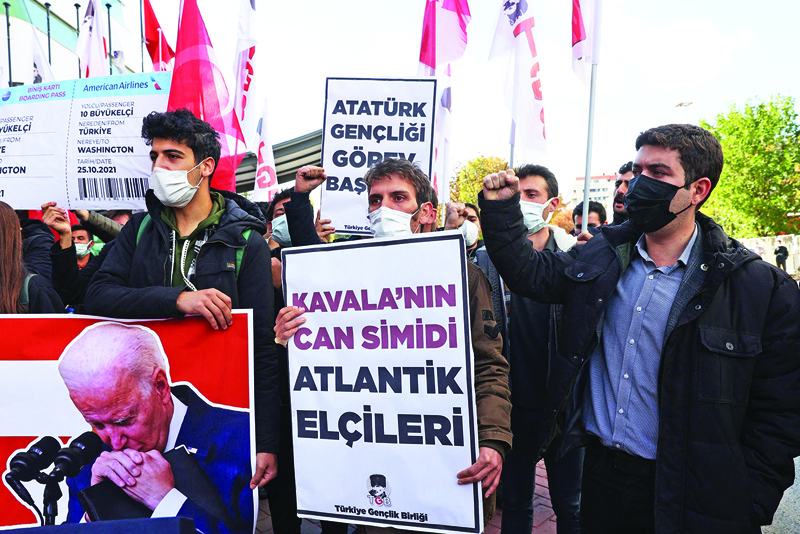 MARDIN: Members of the Youth Union of Turkey organization (TGB) gather to support Turkish President’s call to expel the ambassadors of 10 Western allies in front of the US embassy in Ankara yesterday. – AFP
MARDIN: Members of the Youth Union of Turkey organization (TGB) gather to support Turkish President’s call to expel the ambassadors of 10 Western allies in front of the US embassy in Ankara yesterday. – AFP
ANKARA: The Turkish lira surged yesterday on expectations that President Recep Tayyip Erdogan was ready to walk back from his threat to expel 10 Western ambassadors over their statement of support for a jailed civil society leader. The United States and several of the concerned countries issued identical statements yesterday saying they respected a UN convention that required diplomats not to interfere in the host country's domestic affairs.
The Anadolu state news agency said Erdogan "welcomed" the reassurance before heading into a cabinet meeting focused on what had threatened to become the most serious diplomatic crisis of his 19-year rule. The lira pulled back from a historic low and was trading up half a percent against the dollar on expectations that Erdogan would announce a compromise solution in a television address later on.
He had originally threatened the ambassadors on Thursday and then doubled down-pronouncing the 10 envoys "persona non grata"-in televised comments on Saturday. Political analyst Soner Cagaptay cited sources as saying the compromise would keep the 10 embassies in Ankara fully open while Erdogan refused "the ambassadors audition at his palace until (scheduled) replacements arrive in Ankara".
'Skipping confrontation'
The crisis started when the embassies of the United States, Germany, Canada, Denmark, Finland, France, the Netherlands, New Zealand, Norway and Sweden issued a unusual statement last Monday calling for the release of jailed philanthropist Osman Kavala. The 64-year-old civil society leader and businessman has been in jail without a conviction for four years. Supporters view Kavala as an innocent symbol of the growing intolerance of political dissent Erdogan developed after surviving a failed military putsch in 2016. But Erdogan accuses Kavala of financing a wave of 2013 anti-government protests and then playing a role in the coup attempt.
Kavala's case could prompt the Council of Europe human rights watchdog to launch its first disciplinary hearings against Turkey at a four-day meeting ending on December 2. But Cagaptay and other analysts pointed out that several European powers-including fellow NATO member Britain-refrained from joining the Western call for Kavala's release. "The conspicuous absence of the UK, Spain, and Italy... is telling, pointing at the emergence of a sub-group within the Western family of nations adept at skipping confrontation with Ankara," Cagaptay wrote.
'False justification'
Erdogan's rule as prime minister and president has been punctuated by a series of crises and then rapprochements with the West. But analysts felt the expulsions threatened to open up the deepest and most lasting rift to date. They would have also cast a pall over a G20 meeting in Rome this weekend at which Erdogan had expected to discuss with President Joe Biden his hopes of buying a large batch of US fighter planes.
Erdogan this month further threatened to launch a new military campaign in Syria and orchestrated changes at the central bank that infuriated investors and saw the lira accelerate its record slide. A dollar now buys about 9.6 liras. The exchange rate stood at less than 7.4 liras at the start of the year-and at 3.5 liras in 2017.
Turkey's financial problems have been accompanied by an unusual spike in dissent from the country's business community. The Turkish Industry and Business Association issued a veiled swipe at Erdogan last week by urging the government to focus on stabilizing the lira and bring the annual inflation rate-now at almost 20 percent-under control. Main opposition leader Kemal Kilicdaroglu accused Erdogan on Saturday of trying to trying to "create false justification" for Turkey's economic woes ahead of a general election due by June 2023. - AFP
.jpg)



